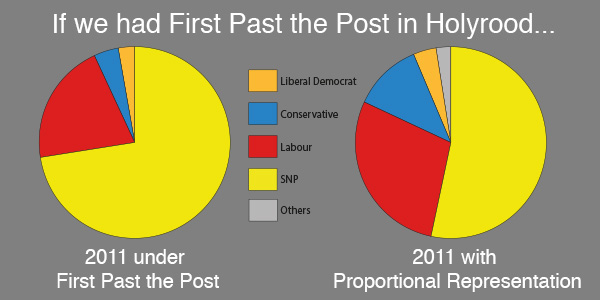
The Scottish Conservative Party conference happened last weekend, and one of the highlights for us was the launch of a new pamphlet, “Light Blue Ideas”, edited by Professor Alan Convery. Alan is a lecturer in politics at Edinburgh University, and has brought together a stellar cast of policy experts and academics to propose ways in which the Scottish Conservatives might modernise themselves to contend for power in the changed world of post-referendum Scotland.
Councillor Dave Dempsey, an electoral reform supporter who leads the Conservative group on Fife Council contributed a chapter. His argument is simple: there has never been a better time for the Conservative Party to support electoral reform. Here are four reasons why:
1. National democracy is in crisis
Although we’ve got a majority at Westminster and were on the winning side in the Independence referendum, there’s plenty for Conservatives to worry about. The legitimacy of the British political system relies on it being able to gain the trust and support of people across the UK. As we saw in the referendum, one of the most powerful arguments for independence was that “Scotland doesn’t get the governments we vote for.” This isn’t just a problem in Scotland: across the UK, parties are increasingly territorialised, with the SNP predominant in Scotland, Labour in the urban north and London, and the Conservatives in rural areas and the south. Not only does this threaten the future of the union and the legitimacy of the political system, but it undermines our claim to govern on behalf of the whole country.
2. Electoral reform would boost the Conservatives across the UK
In much of the country, the Conservatives win barely any seats despite winning up to twenty percent of the vote. In the north of England, for example, we win a far lower share of council seats than votes. In Scotland, the Conservatives have just one MP despite winning fifteen percent of the vote. The talents of potential Conservative leaders of the future go to waste if they grow up in the wrong area. Facing the choice of moving their families out of the communities they grew up in to be parachuted into a new constituency they have no connection to, many choose to leave politics to others. Proportional representation would give Conservatives considerable representation in all areas of the country, and would help to dispel myths about certain nations and regions of the UK being inherently “anti-Tory”.
3. The Conservatives need a membership boost
Conservative Party membership is in dire straits. While Labour, the Greens and the SNP have all gained enthusiastic members of all ages, the Conservatives have continued to lose members and have failed to attract young members in particular. Proportional representation would help to expand our membership base across the country, by bringing Conservative voices and ideas from all parts of the UK into the public eye and providing local Conservative role models for potential young members.
4. Scotland shows the benefits of proportional representation – and the dangers of First-Past-The-Post
The Conservatives had almost vanished from the political map in Scotland when the Scottish Parliament was established. But thanks to the proportional system at Holyrood, the party was able to regain a foothold in Scottish politics. Conservatives are in power, alongside other independents and parties, in nine Scottish councils. Between 2007 and 2011 the Conservatives were able to provide a particularly strong voice for their supporters in parliament, supporting the SNP’s minority administration where necessary in order to shape aspects of government policy. The condition of the Labour Party today also offers a stark warning to those who believe that first-past-the-post is in their political interest: the party was encouraged to take Scottish ‘safe seats’ for granted, until the tipping point was reached in 2015 and Labour was nearly wiped off the map. The Conservatives may seem secure in parts of England for now – but with the approaching EU referendum, Labour’s fate should be seen as a warning.
‘Light Blue Ideas’ was launched at a fringe event at the Scottish Conservative Party conference, Murrayfield Stadium, on Friday 4th March, 12:30pm in the Davies and Ireland Room.
Read the Electoral Reform Society’s Northern Blues: The Conservative Case for Local Electoral Reform and Alan Convery’s Light Blue – Policy Adventures for Scottish Conservatives